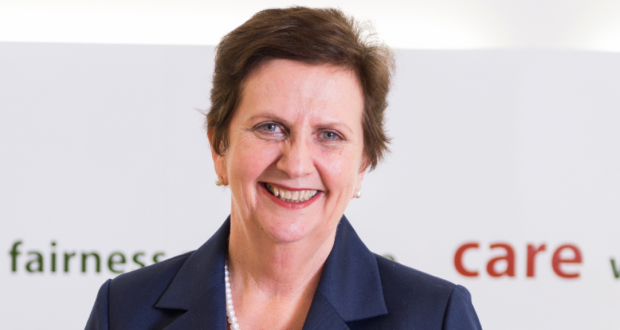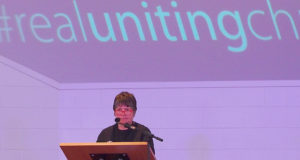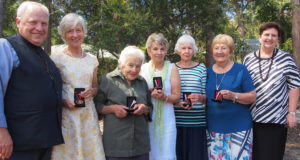Telstra Business Woman of the Year 2014 Anne Cross is CEO of UnitingCare Queensland, the largest not-for-profit health and community services provider in Queensland. Anne talks to Dianne Jensen about her lifelong commitment to building a more compassionate society.
What were the issues that really fired you up as a student?
I was at university in the 1970s, a time of great debate and activism. Up until then it had generally been considered that the introduction of the welfare state, together with the emergence of an affluent society, had put an end to poverty in “the lucky country”. However the issues related to poverty were highlighted in the 1960s and 1970s when it was found that many Australians had failed to share in the post-war economic boom.
Like many young people I was optimistic about social change and I switched from studying science to social work.
What did you learn from your first job as a social worker?
I was fortunate to do some of my practical work at the Brotherhood of St Lawrence in Melbourne. As part of a Commission of Inquiry into Poverty set up by the Liberal Government and then expanded by the Whitlam Labor Government, the Brotherhood ran a family centre project that worked with 60 “poor” families.
It was a complex program accompanied by research and evaluation. It recognised that change had to happen not only in the system but also with individuals and families. I learnt that there weren’t any easy answers to complex problems, and that change is hard and progress is often quite modest. I learnt not to be romantic about people and what was possible, whilst remaining optimistic and committed to a more just society.
How has your understanding of the issues faced by ordinary people made a difference to the way that you approach your role?
I have a deep interest in people; I have great curiosity about what makes people “tick”, about their lives, their challenges and how they cope, about what brings them joy and happiness. I deeply admire people who deal with daily challenges and heartache with grace and fortitude.
UnitingCare is all about people—the people who rely on our services, our staff and our volunteers. As CEO, I think it is critical that I remain grounded in the realities of people’s lives and their communities and the realities for our many thousands of staff and volunteers.
What were the key challenges in transforming a network of health and community service organisations into a corporate model?
The Queensland Synod demonstrated extraordinary foresight in the decision to consolidate the many health and community services; as hard as those decisions were, the Synod was ahead of others who have had to do it in even more challenging environments.
Each of the services had a unique culture that of course was influenced by local people, conditions and history. So it will come as no surprise that one of the biggest challenges I have wrestled with over the years is the creation of a culture that is authentic to what it means to be the Uniting Church “at work in the world”; that honours local strengths, contribution and history but is robust for the current policy and funding environment, and that connects everyone to the UnitingCare network as a whole.
I think the Synod showed the same capacity to make bold decisions when it supported UnitingCare to take on the aged-care services in the Northern Territory previously run by Frontier Services. This willingness to support people and communities that are among the most vulnerable in Australia is very heartening.
In your annual report you talked about the challenges of sustainability. How can an organisation driven by mission survive?
It is true that sustainability is a significant challenge. Competition is increasingly fierce and our cost structures are higher than many of our competitors. Some of this is driven by overheads that come from being part of the church (there are a lot of layers to support) and some of it is driven by our footprint and our service delivery profile.
For example in our aged-care services, 52 per cent of our residents are “concessional” residents. This compares with 18 per cent nationally across all providers. If you are driven by profit then you would not provide services in many of the locations we currently do. You would not deliver the full suite of services we provide in our hospitals. You would largely concentrate on services where people have more capacity to pay. You would also pay your staff less and provide them with less support. You would not invest in research and your advocacy will primarily be self-serving, rather than focused on the wellbeing of people
and communities.
Are aged-care reforms and the National Disability Insurance Scheme (NDIS) moving in the right direction?
Aged-care reforms and the NDIS aim to give more control over decision making to people with disabilities and older people. This is a desirable thing because disadvantaged people struggle to have the autonomy in their own lives that most of us take for granted. However, people have many needs and funding alone and control over that funding does not mean that people will get what they need.
There should be more emphasis on reform of service models and quality of service. In some instances market forces will help drive this, but there is a long history of market failure for people who are disadvantaged either because of where they live or due to other circumstances. There is no market in Cape York, in rural and remote areas or for people who have particular difficulties. The reforms will not benefit all people and we will continue to advocate for models that pay attention to good services for disadvantaged people.
How important is it for service agencies to have a voice in public policy?
Being active in public policy is a core part of our mission and we commit significant resources to our advocacy work. Over the past few years we have concentrated on a number of issues where we have a great deal of experience, the main ones being aged-care reform, disability and at the state level, the review of “out-of-home care” for children in the child protection system.
In addition to direct advocacy on issues relevant to Indigenous Australians and rural and remote service delivery, we have also joined the Recognise campaign which aims to achieve recognition of Indigenous people in the Australian Constitution.
I am currently a member of the Family and Domestic Violence Task Force established by the premier and led by Dame Quentin Bryce. This is a great opportunity to review and tackle this serious community issue.
How do your personal spiritual beliefs drive your passion for change?
I believe that you do your best work when there is coherence between your personal values and those that underpin your working life. My commitment to social justice was nurtured through my church involvements as a teenager and a young person. My respect for people and my commitment to people having the opportunity to lead a full and valued life is consistent with the church’s view that the work of healing, growth and liberation is God’s work.
I learnt the value of prayer life from my grandmother whom I adored, and that learning has been an important “port in the storm” throughout my life. While I have struggled like many people with the institutional church, it has always been important in my life. I can’t imagine regular involvement in worship and church life not being part of my life.
What are the life-limiting views that we still need to challenge in 2015?
Some things have not changed. Human beings have always reacted to “negatively valued difference”; if you don’t conform to societal expectations, then you are likely to be shunned, discriminated against and treated badly. This has significant consequences for the wellbeing of asylum seekers and many others in the community who are deemed “undeserving”.
Increasingly we live in a society that values individualism and individual achievement over collective responsibility. I think this is having a devastating impact on the most disadvantaged and on the quality of our life together.
To find out more about UnitingCare Queensland visit unitingcareqld.com.au
 JourneyOnline
JourneyOnline







